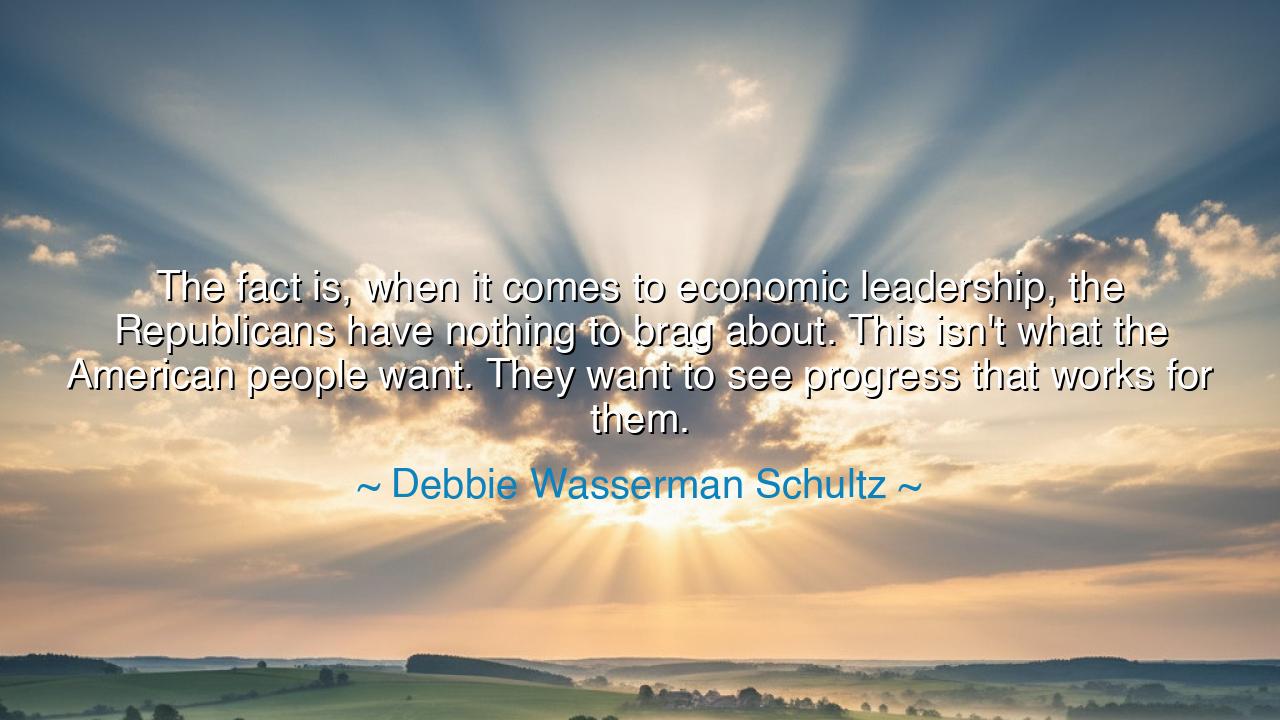
The fact is, when it comes to economic leadership, the
The fact is, when it comes to economic leadership, the Republicans have nothing to brag about. This isn't what the American people want. They want to see progress that works for them.






In the impassioned and unyielding words of Debbie Wasserman Schultz, we hear the cry of one who calls not only for victory, but for vision: “The fact is, when it comes to economic leadership, the Republicans have nothing to brag about. This isn't what the American people want. They want to see progress that works for them.” Beneath these words lies a truth older than nations and political banners — that leadership is not proven by pride, but by results, and that the people do not hunger for speeches or symbols, but for the fruits of honest labor and compassionate governance. Hers is not merely a partisan challenge, but a moral one: to remember that leadership exists not to glorify the few, but to uplift the many.
The origin of this quote arises from the storms of American politics, where debates over economy and justice have long divided parties and peoples. Wasserman Schultz, a voice of her time, spoke during an era when the wounds of financial crisis still bled across the land — when working families struggled to rebuild their lives and sought from their leaders not rhetoric, but remedy. Her statement struck at the heart of governance itself: that economic leadership must be measured by the welfare of the people, not by the applause of the powerful. It was a rebuke to those who mistake wealth for wisdom, and privilege for progress.
Yet her message transcends its moment. For throughout history, civilizations have risen and fallen by the virtue — or failure — of their economic leadership. When kings or parties sought only to enrich themselves, when they boasted of prosperity while their people starved, the foundations of their realms began to crumble. Think of France before the Revolution, where nobles feasted while peasants toiled; think of Rome in its decline, when the emperors built monuments while the empire’s heart decayed. In each age, the lesson was the same: that progress which does not serve the people is an illusion, and that leadership without empathy is a shadow without light.
Wasserman Schultz’s words remind us that the American people, like all people across time, desire not empty glory, but progress that works — a progress felt in the home, the table, and the heart. They do not ask for riches beyond measure, but for fairness, opportunity, and the dignity of work rewarded. The true measure of economic leadership is not in markets or monuments, but in the steady rising of the common soul. And when a nation forgets this, when leaders boast of success while inequality grows, the people’s faith begins to wither, and with it, the spirit of the land itself.
Consider the example of Franklin Delano Roosevelt, who, in the depths of the Great Depression, did not stand before his people to brag of prosperity. He stood before them and said, “The only thing we have to fear is fear itself.” Then he labored to heal a broken nation — not through perfection, but through persistence. His New Deal, though imperfect, sought to make progress that worked — to place bread on tables, hope in homes, and purpose in the hearts of millions. This, too, is what Wasserman Schultz calls for: not pride in party, but the humble pursuit of the common good.
Her words hold a timeless warning to all who would claim the mantle of leadership. Boasting is the weapon of the weak; service, the strength of the wise. The leader who brags of wealth or triumph while his people suffer is like a captain who boasts of the beauty of his ship as it sinks beneath the waves. True leadership looks not upward in vanity, but outward in compassion. It listens before it speaks, and acts before it boasts. The Republicans, the Democrats, the rulers of any age — all must learn that governance is not the pursuit of victory, but the art of stewardship.
So let this lesson endure: the measure of economic leadership is not in words but in deeds. Let every leader ask, “Does my progress serve the people, or only myself?” Let every citizen remember that power is a trust, not a trophy. And let us, who inherit the trials and triumphs of the past, demand always progress that works for us — progress that feeds the hungry, lifts the weary, and renews the hope of the next generation.
For the glory of a nation lies not in what its leaders brag about, but in what its people become because of them. When leadership serves with humility, when progress is shared, and when words give way to action, then — and only then — will a nation truly stand tall before history, and say not “We have prospered,” but “We have grown together.”






AAdministratorAdministrator
Welcome, honored guests. Please leave a comment, we will respond soon